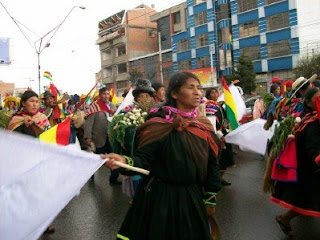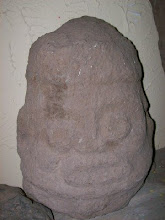


From time to time news say that El Alto within 10 years there may have serious problems of water supply. ¿More shortage? ¿How can it be? El Alto is located about 4100 over sea level and it has around 1.000.000 inhabitants most of which are from aymara indigenous origen. It has a growing population and according to statistical data it is the second biggest city in Bolivia. Now it has 11 districts, 8 urban and 3 rural. According to Fejuve, there are 600 registered neighborhoods distributed in this city. A high porcentaje of its population is young since families tend to have more than two children. Unfortunately, many people doesn´t have yet access to drinkable water.
El Alto is supplied by water that comes from mountains. However, mountains through the years have been losing their white layer and it is said that in some years they will have lost all the ice and snow they have. Up to now, this is the main source of drinkable water, which after processed by Epsas is distributed to the neighborhoods in El Alto. Chacaltaya was one of the most well-known snow-covered mountains. Local and foreign people used to go there to sky, but now an important part of it doesn´t exist any more. Only rocky mountains stay as remembrance of what 10, 20 and 30 yeas ago was completely white.
Additional conditions difficult access to water. A lot of people arrive from rural area to El Alto and establish wherever they can. Because of lack of money, they live in neighborhoods where there is neither drinkable water nor sewer system. Some of them dig a hole which should be about three metres deep until they find water. More or less in November, it starts rainy time and it is other possibility for neighbors to collect water. At the end, lack of water added to existent levels of poverty many times result in illnesses.
There is an heterogeinity of situations. I have water at home but some of my neighbors don´t. This is a serious problem for the families. In my case, I share water with other family. Basilio and Juana have four children. They are renters. The house where they live doesn´t have drinkable water. Whenever they need, they use a hose to collect water from my house and at end of the month we divide the cost of water invoice to pay.
It is important that all the families could have water at home but it is not always posible. In August 16th. neighborhood there are only public places from where, people can collect water. Generally, children carry water to their houses.
La Paz is also supplied by water that comes from the mountains. For example, many small towns sorrounding Illimani mountain benefit from its waters for domestic use. Illimani is one of the most visible mountain. Local researchers say that it is also losing its snow. Part of the State Constitution says that “Hidric resources in all their states are strategic, vulnerable, finite resources and have a social, cultural and environmental role”. Mountains are considered Achachilas by indigenous peoples here. Achachila is a spiritual guide to which rituals are made in certain dates.
El Alto is supplied by water that comes from mountains. However, mountains through the years have been losing their white layer and it is said that in some years they will have lost all the ice and snow they have. Up to now, this is the main source of drinkable water, which after processed by Epsas is distributed to the neighborhoods in El Alto. Chacaltaya was one of the most well-known snow-covered mountains. Local and foreign people used to go there to sky, but now an important part of it doesn´t exist any more. Only rocky mountains stay as remembrance of what 10, 20 and 30 yeas ago was completely white.
Additional conditions difficult access to water. A lot of people arrive from rural area to El Alto and establish wherever they can. Because of lack of money, they live in neighborhoods where there is neither drinkable water nor sewer system. Some of them dig a hole which should be about three metres deep until they find water. More or less in November, it starts rainy time and it is other possibility for neighbors to collect water. At the end, lack of water added to existent levels of poverty many times result in illnesses.
There is an heterogeinity of situations. I have water at home but some of my neighbors don´t. This is a serious problem for the families. In my case, I share water with other family. Basilio and Juana have four children. They are renters. The house where they live doesn´t have drinkable water. Whenever they need, they use a hose to collect water from my house and at end of the month we divide the cost of water invoice to pay.
It is important that all the families could have water at home but it is not always posible. In August 16th. neighborhood there are only public places from where, people can collect water. Generally, children carry water to their houses.
La Paz is also supplied by water that comes from the mountains. For example, many small towns sorrounding Illimani mountain benefit from its waters for domestic use. Illimani is one of the most visible mountain. Local researchers say that it is also losing its snow. Part of the State Constitution says that “Hidric resources in all their states are strategic, vulnerable, finite resources and have a social, cultural and environmental role”. Mountains are considered Achachilas by indigenous peoples here. Achachila is a spiritual guide to which rituals are made in certain dates.
Bolivian Constitution, says that “Water is a fundamental right for life. The State will promote use and access to water based on the principles of solidarity, reciprocity, equity, diversity and sustaintability”. State will protect and guarantee the prioritarian water use for life. Although it is being installed water nets, it seems that population grows quicker and a combination of factors: lack of the proper technology, human and economical resources complicates the situation. So, it is probably that when all citizens may have drinkable water system at home, there won´t be water because all the snowed-covered mountains would have melted. El Alto has water problems now and nature doesn´t wait.. Please, stop warming the planet: ¡We need water!.
Picture 1: Part of Chacaltaya mountain with a view of Illimani mountain.
Pictures 2 and 3: Parts of Chacaltaya mountain.

























































